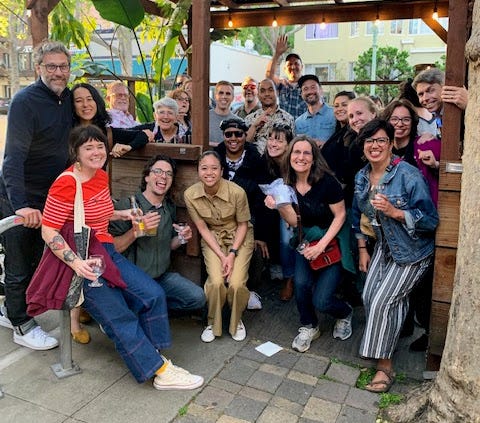#440: An Age of Hyperabundance
Articles on artificial intelligence, being single, the power of reading, and leggings
Hi Loyal Readers. A few weeks ago, I was reading a newsletter written by someone I respect. Good person, good writer, good newsletter. Halfway through, something wasn’t quite right. My stomach fell. I felt discombulated.
And then it hit me: I was reading AI.
It wasn’t my first time, of course. AI-generated prose is everywhere now. But still, I felt cheated. Maybe it’s because I want to believe that when we put our name on something, it means we wrote it. At the least, it should mean we should cite our sources and collaborators.
But I’m coming around to the fact that AI is here, and it’s not slowing down. This week’s lead article, “An Age of Hyperabundance” (public link) discusses the latest trends in conversational artificial intelligence. The piece might terrify you, or you might be excited by the future’s possibilities. I’d love to know what you think. Feel free to share your perspective in the comments.
If AI is boring to you, I have three other articles for you to check out. They’re about:
the distinction between tights and leggings (important!)
📚 All right, it’s time to get to the articles. Hope you enjoy them.
🎙️ One more day to sign up: Next Sunday, April 28, we’re discussing “The Colorblindness Trap,” by Nikole Hannah-Jones, via Zoom, 2:00 - 3:30 pm PT. I would be delighted to have you join.
1️⃣ An Age Of Hyperabundance
What happens at an artificial intelligence conference? Laura Preston knows. Not only did she attend the Project Voice Conference in Chattanooga last year, but she also delivered a keynote address, as its “contrarian speaker.” That is to say, Laura was the one person the organization invited to share the possible ills of conversational AI.
In this disturbing, funny, and well-written article, Ms. Preston recounts her experience at the conference. You’ll meet Keith, who believes virtual assistants will keep our elderly company and help them take their medicine. “There’s not going to be a choice,” he said. “A lot of old people are going to be talking to avatars in ten years, and they won’t even know it.”
You’ll also meet Caitlyn, whose AI can determine your mental health with a 40-second recording of your voice. And a chatbot that will tell you to euthanize your dog, without first visiting your veterinarian. And an avatar that will remind you over and over again that she’s not a doctor, yet nonetheless chastise you about your cholesterol.
Besides the creepiness of it all, Ms. Preston points out an important danger as we shift from a search culture to an AI culture. With Google, there’s still some agency in typing what we’re looking for and rummaging through results. With AI, we get just one answer, “packaged as authoritative” (based on whose expertise?) and giving “the impression of thought.” Will this be what knowledge becomes?
➕ Ms. Preston joined Article Club last March, when we discussed her outstanding piece, “HUMAN_FALLBACK” (so good).
By Laura Preston • n+1 • 20 min • Public Link
2️⃣ On Being Queer And Happily Single
Brandon Taylor, author of Real Life and The Late Americans:
“Sometimes when I’m talking about my work with friends, they ask me: ‘Yes, that’s great, but how are you?’ What they mean is, ‘But why aren’t you dating? Why are you alone?’ As if there’s only one way to be lonely, as if sex and romantic love were the only thing a person could long for. There’s something that happens in our conversations that makes it easy to quip or reduce the scope of a person’s life and all their desires to the presence or absence of a sexual or romantic partner. I say, ‘Oh, who knows, I’m happy. I’m fine.’
“And then, I guess, I feel like a hypocrite, because while I do bristle when people ask me questions like that, I do long for something. And I’m only just now able to scrape away the simple surface of it. Recently, another friend came to stay with me for a couple days. We had coffee and tea. We ate meals together. We looked at books. We had long conversations deep into the night. We challenged each other. We engaged each other. We were active and present to each other’s presence in the room. He is thoughtful and good. He is the sort of boy I’ve fallen in love with my entire life — wounded and a little sad, but with smart, searching eyes and a depth of acuity that is rare in the world. But I did not fall in love with him, not really. Instead, I think, we fashioned the sort of intimacy I’ve always longed for. To be open to another person; to be aware of them, their faults, their glories, their ugliness, their beauty.”
By Brandon Taylor • Them • 8 mins • Public Link

3️⃣ Books Were My Lifeline
Here’s yet another example of why I believe that reading is the thing. Before Reginald Dwayne Betts became a lawyer and a National Magazine Award winner and a MacArthur Fellow, he spent eight years in prison. “Prison is the world’s most universal method of torture,” he writes in this thoughtful essay. “Prison is the symbol of all the hurt in the world.” To mitigate his suffering, Mr. Betts turned to reading books and writing poetry. He writes, “Books are central to the fight against the disappearing that follows a prison sentence. There is a particular kind of beauty in the belief that freedom might begin with a book.” Now Mr. Betts serves as the founder and director of Freedom Reads, a nonprofit organization that places libraries in prisons.
By Reginald Dwayne Betts • The Washington Post • 4 min • Public Link
4️⃣ Tights vs. Leggings (vs. Stockings vs. Pantyhose)
I like words (example: chimera). In high school, I used to study my copy of the Webster’s New World Dictionary to parse meanings of similar words, like urge and encourage and exhort and and implore and prod. (You get the point.) Then senior year, my friends and I collected names that are also words (examples: Neil, Marlon). In college, my roommate laughed at me when I asked, “What really is the difference between a coat and a jacket?” (He couldn’t tell me. Can you?) This is all to say: I can’t believe I didn’t think of this article (and book) by Eli Burstein, who has compiled this delightful set of similar words that “probe all the nuances, niceties, and subtle shades of meaning your little heart desires.”
By Eli Burstein • Hazlitt • 6 min • Public Link
Thank you for reading this week’s issue. Hope you liked it. 😀
⭐️ You may have noticed a recent new feature: public links. I want to make sure that you don’t hit a paywall when reading articles in my newsletter. If the “Read the article” button leaves you stranded, click the public link instead. You’ll be sent to a clean reading experience that includes the entire article, as a gift to you.
To our six new subscribers — including Beatrice, Barbara, Erika, Kellie, Kellie, and Em — I hope you find the newsletter a solid addition to your email inbox. Welcome to Article Club! Make yourself at home.
Dear readers, if you appreciate Article Club, please feel free to leave me a voicemail, recommend the newsletter to a friend, or buy me a coffee. ☕️
On the other hand, if you no longer want to receive this newsletter, please feel free to unsubscribe below. See you next Thursday at 9:10 am PT.








Great articles! I love that books can fly between gen pop and the SHU in prison. The kind of intimacy described in that next article seems so much more appealing than sex. AI appears to be the ultimate source of disinformation and algorithms truly harmful to real people. Finally, I loved the article about comparative meanings. The opening drawing of venomous (animals) and poisonous (plants) drew me in immediately. Week after week, you continue to knock ‘em out of the park! THANK YOU. 🙏
I wished I lived closer to go to one of the meetups. One day I’ll get there. Great reads this week as always.